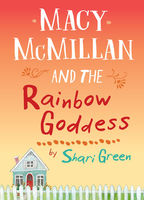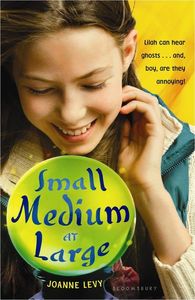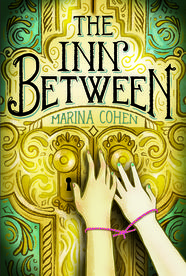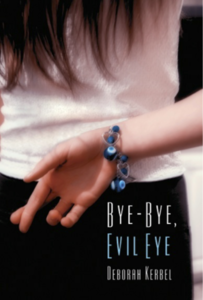Kid Lit Can: Spotlight on Middle Grade Fiction - Part 2
By Susan Hughes
Today I continue my chat with four terrific middle-grade novel authors. They’ll share more about their writing process, their aspirations for their writing -- and even reveal something … well, something they don’t really want us to know!
Welcome back and thank you to Shari Green, Joanne Levy, Marina Cohen, and Deborah Kerbel.
Susan:
Please finish this sentence: For me, the most difficult thing about writing MG is …
Shari:
… not cussing. Ha! Just kidding. Let me try again. For me, the most difficult thing about writing MG is having enough action to move the story forward. Basically, remembering to have a plot. Actually, that’s always the most difficult thing about writing for me, not only with MG…something has to happen!
Joanne:
… keeping my middle grade voice sounding relevant. I work very hard to ensure kids can relate to my voice while keeping it as timeless as I can. Using too much current slang will quickly date the book, but at the same time, I don’t want to sound like a stuffy old grown up trying to sound like a middle-grader. It’s a fine balance.
Marina:
... presenting difficult—sometimes quite harsh—concepts in an understandable, acceptable middle grade fashion.
Deborah:
… pinning down and maintaining a strong, authentic voice. Also … avoiding distraction while writing.
Susan:
‘Fess up. Word count: Friend or foe?
Your CanLit News
Subscribe to Open Book’s newsletter to get local book events, literary content, writing tips, and more in your inbox
Shari:
When I’m drafting, I look at my word count tally way more often than is healthy! I don’t shoot for a particular number each day, but some part of me must believe a decent word count is the measure of a good day’s work. It’s a lie, though. For me, a day spent daydreaming and mulling over my characters’ lives can be more “productive” than racking up the numbers.
That said, eventually the total matters, at least to a point—I mean, the story’s done when it’s done, but if I write something way under or over the typical MG word count, I’m adding another challenge to getting it published. (Verse, of course, tends to be much lower word count—I think RBCAOM is about 20k.)
Joanne:
Friend. Good friend. J When I’m actively writing a project (because I don’t write every single day) I keep a tally of words so I can see my progress. I find that to be a great motivator and it keeps me on track. Generally, I call 1000 words my daily minimum, but some days I really struggle and I allow myself that. I don’t beat myself up if it doesn’t happen—it just means I need to step back and figure out what happens next because that’s always what trips me up. Some days I do 3 000 or 4 000, which definitely makes up for the struggle days.
I tend to write very short, so I aim for about 30 000 words for a middle grade novel. I think length for MG is like any other genre: whatever works for the story is best. Though I do keep the audience in mind, too. If I’m writing something that I think will appeal to reluctant readers in style, story, and language, I’d be making a mistake writing a 100k story.
Marina:
I honestly don’t think about word count. I sit down and write my story and however long it takes to tell it is how long the manuscript is. Every story has an arc and I think if you stretch the plot it becomes thin, and if you cut it short it will not be satisfying.
Deborah:
Word count is definitely more friend than foe. Although I think of it as more of a moving target. My books range in length, but 30 000 words is always my initial goal for a first draft. Once that magic number has been reached, I know I’m at least half way done, if not in the home stretch. And for me, that’s when the writing adrenaline really starts to kick in.
Susan:
Are you an outliner or are you a write-by-the-seat-of –your-pantser?
Shari:
I’m a pantser and also a muller (mulling is a bit like unofficial, non-binding planning, haha). Basically, I spend a lot of time in my head, then start writing and see what comes out. I sold my second MG novel on proposal, though, which meant I had to make an outline…yikes! In the past, outlines have meant the death of my enthusiasm for projects, but fortunately I’ve learned to view them as guides rather than shackles. One day, I might even like outlining. (Stranger things have happened, right?)
Joanne:
I’ve always been a pantser. For me, the joy in writing is discovering the story through writing it. BUT, I have learned that writing to an outline, while less satisfying to my creative side, is a lot smarter and easier in the end. I’m actually working on something now that is so complicated that I have no choice but to outline.
Marina:
I’m a little of both. I never sit down to write until I know a few things: the inciting incident, the ending, three major plot points, who my character is, and what they want. Then I pants it and it begins to morph and take shape. That being said, I struggled for three years with my newest manuscript and what finally helped me complete it was a large piece of Bristol board and a whole lot of different coloured stickies. There were so many threads in this story that if I didn’t plot them all out I risked dropping one and leaving a gaping hole.
Deborah:
Both. I admit, I don’t have a standard approach to writing books. Sometimes I outline meticulously, other times I fly by the seat of my pants. Feathered was most definitely a pantser. The book I’m writing now, however, has been outlined to within an inch of its life.
Susan:
Please finish this sentence: I wish my writing could …
Shari:
… make hearts large. This is from a favourite quote of mine—from Kate DiCamillo, who said, “We have been given the sacred task of making hearts large through story.” Stories have the power to give hope and to grow empathy, and if I can do that even a little, then all the work, all the rejection, all the hours and pages and trying—the whole journey—will be worth it.
Joanne:
I should say something like enable world peace, right? But the truth is I look for success on a much smaller scale. I endeavor to entertain readers and maybe take them away from their everyday stress (because being a kid, especially these days, can be very stressful) even if for only a short time.
Marina:
… move my readers in a small, but profound way.
Deborah:
… convert just one reluctant reader into a rabid, life-long book lover.
Susan:
What are your favourite two consecutive sentences from any of your books?
Shari:
This is from RBCAOM, after Bailey’s brother teases her about looking for the face of God in the designs fried into her pancakes:
He was only little
when Aunt Debbie discovered Tom Hanks
staring at her
from her breakfast plate.
She watched every one of his movies
after that,
said it changed her life.
Joanne:
Um. The last two I wrote? I honestly can’t say I have two sentences that stand out to me—I’m more about jokes than specific language and most of my jokes would probably be at least three sentences, so if I tried to paste a partial joke here, well, you wouldn’t think it was very funny.
Marina:
This is difficult! How about the first page of The Doll’s Eye, when my MC, Hadley, sees her new house for the first time:
Tall and looming, the red brick was faded, the wood trim weathered with age. Through the haze of August heat, it appeared blurred, like an old photograph, ghostly out of focus.
Deborah:
Yikes. That’s hard! I think I’ll choose something from Under the Moon (because I happen to have a copy conveniently within reach):
I like to think of myself as an oxymoron. And no, that’s not a brand of zit cream.
Susan:
Finally, I just gotta ask: What’s one thing you wouldn’t want us to know about you?
Shari:
This is a little thing, but before I was published, I probably wouldn’t have wanted you to know my age. Maybe I thought there was some shame in being a late-bloomer—coming to writing later in life and having a “long and winding road” to publication. But now I know that everything I learned and experienced before being published contributed to making me the writer I am. (And in case I’ve got you curious…I’m 53.)
Joanne:
That I like to kick puppies? I’M KIDDING. I’m an animal-lover, really. One of my secrets that I’ve never publicly admitted to is that I hate magic. I’m way too pragmatic to suspend my disbelief to appreciate it. The only way I’ll watch magic is if I know the magician will reveal the trick right after—that I find interesting.
Marina:
I am an abysmal speller.
Deborah:
Every time I finish writing a book, I’m 100% certain I’ll never manage to write another one again. I’m always wrong.
Shari Green is in love with stories and the sea. She lives in Campbell River, BC, with her husband, kids, and the worst watchdog ever. Visit her online at www.sharigreen.com.
Joanne Levy is the author of two MG novels. She lives in Ontario, Canada with her husband, Labrador Retriever, African Grey Parrot, and two cats, one of whom vomited during the writing of this bio. Visit her online at www.joannelevy.com
Marina Cohen lives in Markham, Ontario, where she spends far too much time asking herself, “What if?” Her website is www.marinacohen.com
Deborah Kerbel is the author of six novels for young adult and middle grade readers. In real life, she lives in Thornhill, Ontario with her husband, two kids, and a rescued Schnoodle named Alfredo. Online, she lives at www.DeborahKerbel.com or @DeborahKerbel.
The views expressed by Open Book columnists are those held by the authors and do not necessarily reflect the views of Open Book.
Susan Hughes is an award-winning author of children's books — both fiction and non-fiction — including The Island Horse, Off to Class, Case Closed?, No Girls Allowed and Earth to Audrey. She is also an editor, journalist and manuscript evaluator. Susan lives in Toronto. Visit her website, www.susanhughes.ca.







